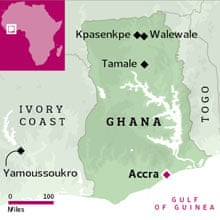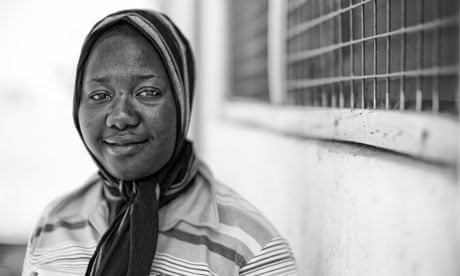Early last Sunday morning on a plane ride from the Ghanaian capital, Accra, to the northern town of Tamale, Jeffrey Sachs – director of the Earth Institute research group, economist at Columbia University and international development expert – is explaining what happens when you move from the south of the country towards the north.
"If you look at Ghana and all of west Africa, it's wet in the south, and as you go further north you get into desert. All of west Africa is graded by climate. It's cocoa plantations and tree crops and palm oil up the coast, but as you move north you move into the savannah, and as you go further you get to the desert.
"In general, the farther you go north, the drier you go, and in general as you move from south to north you also go from more Christian to more Muslim communities. And as you move from wetter to drier, you go from sedentary agricultural to more pastoral. And whenever in economics you go from the coast to the interior you almost always go into a poor economic gradient.
"Everything about this trip from Accra to Tamale is moving towards more poverty in Ghana and more Muslim, more distance from markets, less productive agriculture, lower population densities, and more marginalised politically."
This brief assessment offers a unique insight into why aid is becoming not just an ethical but a political issue. And why Ghana, one of the most stable and economically successful countries in Africa, recognises how imperative it is to address poverty and infrastructural failings in its northern territories.
If they were in any doubt, they just need to look to near-neighbour Nigeria, where escalating sectarian violence is spreading between the largely Christian south and the Muslim north. The situation maps precisely what Sachs has outlined: Nigeria's northern regions are climatically stressed, economically disadvantaged (Nigeria's oil reserves are in the south), agriculturally challenged and politically marginalised. The lessons from Nigeria are all too clear – and increasingly brutal and bloody.
By any measure Ghana is a success story. The first African country to gain independence in 1957 following 83 years of colonial rule by the British, it is now a stable democracy whose last five elections have been deemed free and fair. It has made huge progress in reducing poverty, having already met the millennium development goals on poverty and hunger, and boasts a growth rate that places it among the best-performing economies in the world.
And yet these impressive statistics seem to count for very little when we arrive, after a two-and-a-half-hour journey north of Tamale, at the small village of Kpasenkpe and visit the clinic.
It is a clinic, in a sense. There is a building, and a nurse. There are vaccinations for children's immunisation programmes. But there is precious little else in this bare, three-room brick building. A few yards in the dusty distance are some small houses; in better days, these served as nurses' quarters.
Fatahiya Yakubu, 24, is one of the two nurses at the clinic serving 30,000 people in this and neighbouring villages. Only it doesn't serve them. Not really. It has nothing to offer beyond vaccinations and wound dressings.
Yakubu is stoic as she surveys the barren clinic. She tells a story of a man who arrived on a day when it was short-staffed and there was no one to put a tourniquet on his wound. The nearest hospital is an hour and a quarter's drive away in Walewale, but there are no cars here and the single ambulance that serves the area has to cater for over 100,000 people. The patient died before he could reach hospital.
Yakubu is trained to nurse, but the scope for nursing is limited. "If this place got help, things would go very well and our dreams would be met," she says.
Bono, lead singer of U2 and a veteran aid activist, is also on the trip representing ONE, the advocacy group he helped set up, which, with various partners, is campaigning for transparency in Africa's booming commodities industry.

It is also fighting for countries such as the UK to double "smart", or evidence-based, aid for the Global Fund, founded by former UN secretary general Kofi Annan to fight HIV/Aids, tuberculosis and malaria. He is listening to Yakubu's story; when she has finished he remarks, partly to himself, and partly to her: "It's a ghost clinic – it's a memory of a clinic."
Prior to the visit to Kpasenkpe, where he teamed up with Sachs – a key architect in creating the Global Fund – Bono hosted a group of senior Republicans from the US Senate in Accra. After visiting Ghana he spent the rest of the week travelling to neighbouring countries.
Bono can be a lightning rod for criticism, though few of his critics probably know much about the time he spends in Africa, or his lobbying in the world's capitals as he pesters foreign leaders for foreign aid. His critics are voluble, but it is difficult to argue with the improvement in the lives of African people who escape the scourges of HIV, TB and malaria as a direct result of the programmes that he and his aid partners support.
For Yakubu, help is, luckily, at hand, since Sachs has travelled here to formally announce that the next "Millennium Village" will be in Kpasenkpe. The Millennium Villages project is led by the Earth Institute, the development organisation Millennium Promise and UN agencies. It takes a radical approach to aid, targeting five principal causes of extreme poverty and addressing all of them in an integrated way: health, education, agriculture, rural infrastructure and economic development. The aim is to create one joined-up aid programme instead of having different aid agencies tackling these issues separately.

The most radical aspect of the Millennium Village concept is twofold: firstly, it involves local government and implementation by the communities themselves; and secondly, it is designed to create sustainable communities that will outgrow the need for aid. A village will be subject to rigorous evaluations in order to demonstrate sustainability and scalability, and that aid developed with an exit strategy can actually work.
In an external review of the Millennium Villages project, the Overseas Development Institute recorded crop yield increases of between 85% and 350% and reductions of up to 50% in the incidence of malaria.
It is this evidence-based approach that gives Sachs the confidence to stand in front of what seems like the entire village gathered in the elders' meeting area to greet the delegation of politicians and development experts. Sachs is unequivocal as he takes the microphone and proclaims, in almost messianic fashion: "You are going to see an improvement in the lives of your people. I promise you, one year from now, your health facility will be functioning and known throughout the region."
He then lists the improvements to come for farmers, students, mothers, girls in education; it is akin to a stump speech and is greeted with cheers by the locals. "We have five years to make programmes that work for farming, health care, schools, for increasing incomes and improving the lives of your communities. We have a lot of work to do together."
The Kpasenkpe clinic must wait for the aid to arrive but the omens are promising, because the next day we visit Tema hospital in Accra, which has been receiving aid from the Global Fund. The contrast with Kpasenkpe couldn't be more stark. And the contrast between the brave but beleaguered Yakubu and Tema staff doctor Patricia Asamoah could not be more marked. Asamoah is positively beaming as she shows us around. This is a happy hospital; a functioning hospital. But it wasn't always like this.
The impact of the Global Fund is everywhere. We visit the anti-retroviral unit, where patients with HIV/Aids are being treated. It is ordered and functioning much as any hospital would. But Asamoah remembers a different time: "Before we got help from the Global Fund, these kind of patients in the ARV unit were all wheelchair-bound. Now they can walk in themselves."
Access to drugs explains the difference. "Our clinics were empty because we didn't have drugs, and instead the hospitals were full. They were more like hospices than hospitals – we didn't have anything to treat patients with."
The same story is repeated all over the hospital: babies being diagnosed with HIV early enough to save their lives; men and women being restored to health after contracting TB; radiant mothers and babies at the antenatal clinic; smiles from the staff and heartfelt gratitude from the patients.
At one point, unprompted, one of the recovering TB patients points to Asamoah and says: "She's my mother – she looked after me, it's all down to her."
This is how it should be, but it's not necessarily how it always will be if the west reneges on its commitment to the next tranche of money for the Global Fund.
Jamie Drummond, the executive director of ONE, says: "ONE helped get the first financing for the Global Fund 10 years ago and it's had a wonderful multimillion-life-saving first decade – but needs a big boost for the next 10 years to not just halt but turn back the tide of Aids, TB and malaria.
A survey just found the Global Fund the second most transparent aid mechanism in the world. That's why One is pushing for the UK to double its funding this year."
The UK government has been steadfast in maintaining its commitment to international aid, drawing high praise from Bono and Sachs (see right), despite a growing clamour for it to cut back on foreign donations.
But the battle for aid will only get more difficult, which is why smart aid programmes like the Millennium Villages project and the Global Fund are all the more important in convincing politicians that investment in Africa makes ethical and economic sense, as a whole new continent of consumers come on stream in a newly dynamic Africa.
And there are the political motivations for tackling poverty too. As Bono remarks: "When extreme poverty, extreme climate and extreme ideology come together, it's a difficult thing to undo."
Increasingly, senior military figures in the US are looking at how aid can be a politically stabilising force – or, as Bono says, "instead of putting out the fires, it is a lot cheaper to stop them in the first place". The fruits of extreme poverty, climate and ideology are being reaped in the horn of Africa, with devastating results.
And then there is a more simple, human response to extreme poverty. As Bono concludes: "It's impossible, I believe, to keep up the scam that brutal, ugly, dumb poverty is something we can live with. That's a scam. You can't live with it if you see it. We bring over tough US military guys and US senators to Africa. When they see it up close – you can't live with it. The only way you can live with it is to lie to yourself and pretend it's not what people say it is."




Comments (…)
Sign in or create your Guardian account to join the discussion